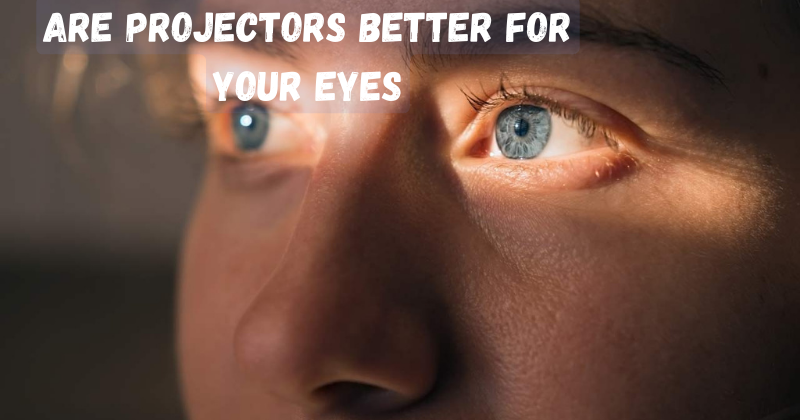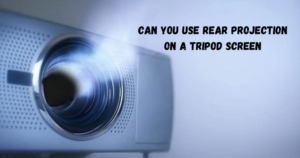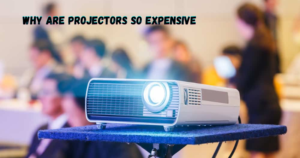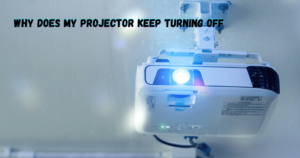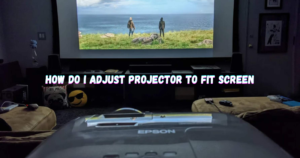Do you often look for an immersive viewing experience without hurting your eyes? More and more people are turning to projectors as the ideal alternative.
But is a projector really better for your eyes than other forms of display?
In this blog post, we’ll uncover some of the facts about projectors, their impact on visual fatigue, and how they can protect or harm your vision in different conditions.
From understanding the importance of ambient light to utilising brightness adjustments that will help make watching easier on the eyes—we will discuss all that and more so you can make an informed decision when it comes to protecting your eye health.
What are Projectors and How Do They Work?
Projectors are devices that take an image or video signal and project it onto a large display surface. They use lenses to focus the light emitted from the light source and create bright, vibrant images. Many projectors can also be connected to computers, phones, or other digital media players for easy playback of videos, movies, and games.
The type of light source used in a projector impacts how clear and crisp the image is. Many projectors use LED or laser lamps, which occupy a smaller space than conventional lamp-based projectors and last longer. They also offer better colour accuracy and increased brightness levels, making them perfect for viewing in brightly lit rooms.
Benefits of Using a Projector
Here are the top benefits of using a projector for watching movies, playing video games, or viewing presentations:
- Immersive Viewing Experience – Watching on a large projection screen helps to create an immersive experience that’s not possible with smaller displays.
- Easy Setup – Projectors are easy to set up and can be quickly connected to other devices like laptop computers, smartphones, and gaming consoles.
- Portability – Depending on the size and weight of the projector, they can be moved around easily to different locations or events.
- Cost Efficient – Projectors are more affordable than other types of displays like televisions, so you can enjoy a cinematic experience without breaking the bank.
Are Projectors Better For Your Eyes
The answer to this question depends on how you use the projector. Generally speaking, projectors offer a clearer picture than other forms of display, which can help reduce strain on the eyes. Additionally, brightness adjustments and room lighting can be adjusted to make viewing easier on the eyes.
However, if there is too much ambient light or excessive brightness from the projector itself, it may cause visual fatigue. Therefore, it’s important to make sure you set up the projector in a room with minimal light and use brightness adjustments to reduce glare from the screen.
When used correctly, projectors can be just as safe on your eyes as other forms of display.
With careful setup and regular maintenance, your projector will give you years of enjoyable viewing without causing harm to your vision.
How to Choose the Right Projector for Your Needs
The right projector for you will depend on what type of content you’ll be viewing and in what environment. Think about the following factors when shopping for a projector:
- Brightness – The brightness of a projector is measured in lumens and will affect both image quality and how visible the display is in brighter rooms.
- Resolution – This refers to the clarity of the image and is measured in pixels. High-definition projectors offer sharper, more vibrant images than lower resolution models.
- Throw Distance – This is how far away from the wall or screen you need to place your projector for optimal viewing. You should determine this before buying a projector to make sure it will fit in your desired space.
How Projectors Impact Eye Health
Projectors are generally safe for your eyes, but there are a few things to keep in mind when using them. The most important thing is the ambient light around you. If the room is too bright, it can cause eyestrain and fatigue by making it harder to focus on the image or content. To reduce this, make sure the projector is set to the correct brightness and that you dim any other lights in the room.
Another way to reduce eye fatigue when using a projector is to adjust the settings or use special features like brightness and color temperature controls. This will help ensure your eyes don’t overwork themselves when trying to make out images on screen.
Finally, take regular breaks from looking at the projector display. This will help you avoid eyestrain and ensure your vision remains healthy.
Advantages of Projectors Over TVs
Projectors offer many advantages over traditional televisions, especially when it comes to protecting your vision. First, the larger size of a projection screen allows you to view content from further away, reducing strain on your eyes. Additionally, projectors are often more affordable than TVs and can be easily moved around for different viewing experiences.
Lastly, many projectors come with more advanced features than standard televisions, such as brightness and color temperature adjustments that can help reduce eye fatigue when watching for extended periods of time.
Tips to Avoid Eye Strain When Using a Projector
When using a projector, it’s important to remember that the size of the image can have an effect on your eyes. To reduce eye strain when viewing content for long periods of time, make sure to adjust the brightness and color settings of your projector accordingly.
Additionally, take regular breaks from looking at the screen to avoid eyestrain. Finally, position the projector at a comfortable distance from your eyes to ensure you’re able to comfortably view the content without straining your vision.
Best Practices for Reducing Eye Fatigue From a Projector
When using a projector, it’s important to keep in mind several best practices that can help reduce eye fatigue. First, ensure the room is adequately lit so as not to strain your eyes when trying to focus on the image or content.
Second, adjust the settings of your projector to make sure it is suitable for your viewing environment. This includes adjusting brightness and color temperature controls to ensure you’re able to view the content without straining your eyes.
Finally, make sure to take regular breaks from looking at the screen to reduce eyestrain. This will help protect your vision and ensure that you can enjoy watching movies, playing video games, or viewing presentations for longer periods of time without hurting your eyes.
Projectors are an excellent alternative to traditional televisions that provide a more immersive viewing experience.
By understanding the importance of ambient light, utilizing brightness adjustments, and taking regular breaks when watching content—you can ensure your vision remains healthy when using a projector.
With the right projector and proper care, you’ll be able to enjoy brighter, sharper images without compromising your eye health.
FAQs
Does a projector hurt your eyes?
A projector generally does not hurt your eyes if used correctly. If there is too much ambient light or excessive brightness from the projector itself, it may cause visual fatigue. To avoid this, make sure the room is adequately lit and adjust the settings of your projector, such as brightness and color temperature controls, to make viewing easier on the eyes. Additionally, take regular breaks from looking at the screen to reduce eyestrain.
How can I protect my eyes when using a projector?
The best way to protect your eyes when using a projector is to ensure the room is adequately lit and adjust the settings of your projector accordingly. This includes adjusting brightness and color temperature controls to ensure you’re able to view the content without straining your eyes. Taking regular breaks from looking at the screen will also help reduce eyestrain and protect vision health.
Are projectors better for your eyes than TVs?
Projectors can be better for your eyes than TVs in some cases. Projectors allow you to view content from further away, reducing strain on your eyes. Additionally, they are often more affordable than TVs and can be easily moved around for different viewing experiences. Lastly, many projectors come with more advanced features than standard televisions, such as brightness and color temperature adjustments that can help reduce eye fatigue when watching for extended periods of time.
Conclusion
In conclusion, projectors can be a great investment for both your home entertainment needs or office presentations.
If you are looking to invest in a projector, the choice can often come down to personal preference and the features you prioritise.
While there are pros and cons for each type of projector technology, LED and laser projectors have less drawbacks when it comes to their effects on your eye health.
Whichever you choose, be sure to keep your distance from the screen and use additional lighting if needed so as to not cause any unnecessary strain on your eyes.
So when it comes to the question – Are Projectors Better For Your Eyes? – The answer is yes, but only if used properly.
By following the right guidelines and maintaining a comfortable distance away from the screen, you will experience improved visuals with no added worries about eye fatigue.
